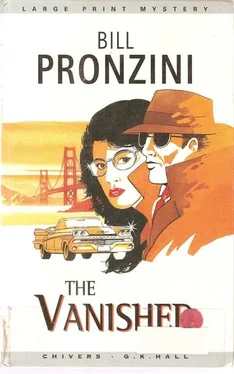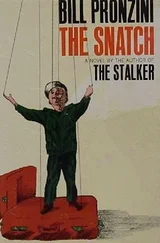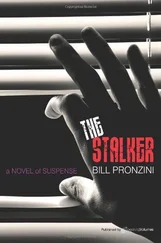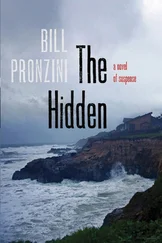Bill Pronzini - The Vanished
Здесь есть возможность читать онлайн «Bill Pronzini - The Vanished» весь текст электронной книги совершенно бесплатно (целиком полную версию без сокращений). В некоторых случаях можно слушать аудио, скачать через торрент в формате fb2 и присутствует краткое содержание. Жанр: Детектив, на английском языке. Описание произведения, (предисловие) а так же отзывы посетителей доступны на портале библиотеки ЛибКат.
- Название:The Vanished
- Автор:
- Жанр:
- Год:неизвестен
- ISBN:нет данных
- Рейтинг книги:3 / 5. Голосов: 1
-
Избранное:Добавить в избранное
- Отзывы:
-
Ваша оценка:
- 60
- 1
- 2
- 3
- 4
- 5
The Vanished: краткое содержание, описание и аннотация
Предлагаем к чтению аннотацию, описание, краткое содержание или предисловие (зависит от того, что написал сам автор книги «The Vanished»). Если вы не нашли необходимую информацию о книге — напишите в комментариях, мы постараемся отыскать её.
The Vanished — читать онлайн бесплатно полную книгу (весь текст) целиком
Ниже представлен текст книги, разбитый по страницам. Система сохранения места последней прочитанной страницы, позволяет с удобством читать онлайн бесплатно книгу «The Vanished», без необходимости каждый раз заново искать на чём Вы остановились. Поставьте закладку, и сможете в любой момент перейти на страницу, на которой закончили чтение.
Интервал:
Закладка:
We sat there on the darkened street. I said, because it had to be said, ‘Cheryl, will you do me a favor?’
‘Yes, if I can.’
‘Don’t mention that you saw me tonight. To your brother, or to anyone.’
‘Why?’
‘My reasons are complicated and not exactly explainable just now. I’ll tell you about them a little later. Okay?’
‘Well… of course, if it’s what you want.’
‘Thanks, honey.’
She turned her face close to mine at the endearment, and her eyes were pools of deep blackness with the faintest traces of light deep at their centers-and I kissed her. She did not pull away and her lips parted slightly under mine, warm and soft and sweet, and I could feel her shudder with inner emotion as I held her shoulders lightly in my hands. I drew back finally, looking at her, wanting her, needing her, sensing the same feelings inside her own body, but this was not the time, the time was perhaps soon and we both knew that, I think, we both were unable to deny that, but it was not just yet.
‘Thank you,’ she said in a soft, liquid whisper, ‘thank you for a lovely evening.’
‘Are you working Saturday night?’
‘No-the day shift.’
‘Can I see you then? I have to go away again, but I should be back by Saturday.’
‘Yes,’ she said.
She touched my hand and we said good night, and then she was out of the car and walking quickly to her own. I sat watching her until she had driven off, until her taillights had vanished around the corner on 19th Avenue, before starting my own car.
The taste and the touch and the scent of her stayed with me all the way back to my apartment.
CHAPTER FIFTEEN
Roxbury was a small town like a thousand, five thousand other small towns spread across the United States-a little more rustic, perhaps, because of its location, but otherwise predictably conventional. It was situated in the thickly wooden foothills of the Klamath Mountains, east and a little south of Eureka; there was a single street bisecting it into equal halves and extending for three blocks, and that was called Main Street and had everything on it that you would expect to find on Main Street, U.S.A. The village looked quiet and sleepy, and the towering giants of the Redwood Empire, which ringed it majestically, gave it an atmosphere of bucolic tranquillity.
I got in there a few minutes past two on Friday afternoon, and it was cool and cloudy, the countryside lushly green and water-jeweled from a recent rain. I had been on the road for something like six hours, including a brief stop in Ukiah for lunch, and I was tired and cramped as I drove along Main Street. The car had not overheated on the drive, but a rattling sound had developed somewhere, in a location I could not pinpoint. It failed to surprise me much.
At the far edge of town, I found a motel called the Redwood Lodge. It had eight cabins set into a rough horseshoe shape, with number one and number eight at the points of the shoe; they were spaced far apart and partially hidden from one another by redwoods and heavy forest growth. In the near-center of the shoe was a large office-and-residence, of the same design as the cabins and fronted with a jungle of ferns.
I stopped in, and a guy who looked a little like Frank Lovejoy rented me number five for eight dollars a night; I was his first customer all week, he said, things were pretty slow this time of year, big rain and all keeps the people away from the scenic areas. He took me out to the cabin personally; it was two rooms and a shower bath, with beamed ceilings and a false fireplace and mountain-cabin furnishings. I asked the guy how you got to Coachman Road, and he told me and wished me a pleasant stay and left me to my own devices.
I changed into a pair of slacks and a light jacket, and got back into the car and continued east and found Coachman Road without difficulty. It was a narrow, humped lane winding upward through heavy copse of redwood and pine, paralleling a small stream swollen by the winter rains. I went about a mile, and a post mailbox appeared to the left; you could just make out the numerals 2619 on the side of it. Beyond the box, an open gate gave on a sideless wooden platform spanning the creek. On the opposite bank a clearing had been cut in the trees and there was a white frame house on it, and a small barn, and a bare front yard containing a Dodge pickup half as old as I was and the bones of a couple of mid-Depression Fords. The hood on the pickup was raised, and a big guy dressed in blue coveralls had his head inside the engine compartment. He pulled it out when the loose boards of the platform protested the weight of my car, and watched me drive up and park on one side of where he was.
I got out and went over to the Dodge. There was an old, battered toolbox open on the ground by the front fender, and beside it, on a piece of grease-marked canvas, were the components of a two-barrel carburetor. The cool, crisp air smelled of conifers and damp vegetation and oil and machinery corrosion.
The guy was about forty, and he had a face like a rubber mask-or a dead man. The lips were thick and bluish-red, the skin had the look and consistency of dried tallow, the eyes were black pouched pits filled with vacuousness. He had thick, muscle-bunched shoulders and hands like the jaws of a scoop shovel. He was watching me curiously, neither friendly nor unfriendly, those empty, bottomless eyes as immobile as a snake’s.
I put a smile on for him. ‘Hi,’ I said.
‘Howdy,’ ponderously, atonally.
‘Is this the Emery place?’
‘Yeah.’
‘Are you Mr. Emery? Daniel Emery?’
‘No, Mr. Emery he went into Eureka today.’
‘Oh, I see.’
‘My name’s Holly. I work for Mr. Emery.’
‘Well, I’m glad to meet you, Holly.’
‘Mrs. Emery, she’s up at the house if you want to see her.’
‘I’ll do that, thanks.’
‘Sure,’ Holly said.
He turned, dismissing me, and got his head inside the engine compartment of the pickup again. I watched him working in there with a box-head wrench for a moment, and then I moved away and went toward the white frame house.
It was a shambling old structure with dull green shutters and a peaked roof and starched chintz curtains in the windows. There was a vegetable garden along one side, and some thin-vined climbing roses clinging like ivy to a trellis built against the right front wall. As I approached, the front door opened and a woman stepped out a few paces, staring at me.
She was very thin, very gaunt, with gray hair that seemed to grow in tufts on a sunken, colorless skull. A crooked witchlike nose protruded from the center of an angular face; above it were two small, lashless eyes with all the color long since faded out of them, and below were bloodless, almost nonexistent lips. Her calves and ankles, visible beneath the hem of an old-fashioned black skirt, were like white birch poles interwoven with the ugly blue threading of varicose veins. She wore an old gray sweater buttoned to her throat, and white ankle socks and dusty nurse-fashion oxfords, and she had about her a look of infinite weariness, infinite hardship-the way the pioneer women of the mid 1800’s must have looked after twenty or thirty years of plains life.
She said, ‘Yes? Was there something?’ She had a shrill, querulous voice, like the cry of a frightened crow.
‘Mrs. Emery?’
‘That’s right. What is it?’
‘I’d like a few words with you, if I may.’
‘About what?’
‘About your daughter-Diane.’
Her head jerked slightly, and her eyes seemed to lift in their sockets, darting, and again I was reminded of a frightened crow. She reached up with her right hand and gathered the material of her sweater tightly at her throat. ‘My daughter’s dead. She died, over in Germany, three months ago.’
Читать дальшеИнтервал:
Закладка:
Похожие книги на «The Vanished»
Представляем Вашему вниманию похожие книги на «The Vanished» списком для выбора. Мы отобрали схожую по названию и смыслу литературу в надежде предоставить читателям больше вариантов отыскать новые, интересные, ещё непрочитанные произведения.
Обсуждение, отзывы о книге «The Vanished» и просто собственные мнения читателей. Оставьте ваши комментарии, напишите, что Вы думаете о произведении, его смысле или главных героях. Укажите что конкретно понравилось, а что нет, и почему Вы так считаете.












